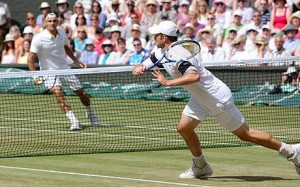It can easily be called the greatest Wimbledon final ever. In 2009, Roger Federer won his sixth Wimbledon men’s singles title – and his record-breaking 16th major singles title – with an epic five-set victory over Andy Roddick. Rene Stauffer, author of the Federer biography ROGER FEDERER: QUEST FOR PERFECTION ($19.95, New Chapter Press, www.RogerFedererBook.com) take readers back to that dramatic Sunday afternoon in this exclusive book excerpt.

Two weeks later when Nadal was forced to withdraw from defending his Wimbledon title due to tendonitis in both knees, Federer was positioned as the overwhelming favorite to win the title. Losing only one set, Federer moved into the final where he faced his old adversary Andy Roddick, who defeated Andy Murray in the semifinals to the disappointment of the British hosts. Federer was not only playing against the American, the man whom he beat in the Wimbledon finals in 2004 and 2005, but once again against tennis history.
Legends such as Rod Laver and Bjorn Borg were in attendance at Centre Court, which for the first time featured a retractable roof. The surprising attendee, however, was Sampras, who flew to London from California with his wife just to watch the final. Sampras had said he would be there on the day that Federer breaks his record and he kept his word.
Federer was tense at the start of the match, missing his typical sovereignty and characteristic lightness for Wimbledon. The final quickly turned into a battle of serves. In a spat of bad luck, Federer was broken by Roddick late in the first set and surrendered the first stanza 7-5. Federer was then lucky to escape from being down two-sets-to-love when Roddick took a 6-2 lead in the second-set tie-breaker, four straight set points. But Roddick missed a seemingly easy backhand volley at 6-5 as Federer seized the second set tie-breaker 8-6, winning six straight points.
The two players each held serve six times to force another tie-breaker in the third set, Federer edging ahead two-sets-to-one with the 7-5 tie-break victory. As the match dragged on, Federer could not defend the overpowering Roddick serve. The American secured another service break in the fourth game in the fourth set and forced the match into a fifth-set. Federer and Roddick continued to exchange dominant service games and the fifth set turned epic. The score went to 5-5, then 6-6, then 7-7, and 8-8. At 8-8, Roddick had a major opportunity to break the Federer serve at 15-40, but the Swiss responded with two big serves.
It was not until the 30th game of the final set when the breakthrough occurred. With Federer ahead 15-14, Roddick misplayed a forehand on the second deuce point, giving Federer his first match point. It is all Federer needed to convert as Roddick mishit a forehand beyond the baseline to secure his first service break of the match, and win his record-breaking 15th major singles title.
After 4 hours and 16 minutes, including a 95-minute fifth set, the final score read Federer as the champion by 5-7, 7-6 (6), 7-6 (5), 3-6, 16-14 margin. The 77 games marked the longest major final in history.
“I am happy that I was able the break the Grand Slam record. Wimbledon is the tournament that always meant the most to me,” said Federer, who set a personal record with 50 aces in the final. “I felt different after the finals than at most Grand Slam tournaments. I didn’t shed a tear, didn’t get emotional like in Paris, Melbourne and a year ago in Wimbledon. At the end I was totally exhausted and tired because of the length and the importance of the match.”
With his sixth Wimbledon title, Federer also replaced Nadal in the top spot in the ATP rankings. His triumph was complete. He reached his dreams. He set new standards in his sport and his career was closer to perfection than ever before. While debating if he is the best player on earth, he provided overwhelming proof and most people gave him the nod as the greatest ever, including Sampras himself.
“I have to give it to him,” Sampras said after the 2009 Wimbledon final. “The critics say Laver, and Nadal has beaten him a few times at majors. He’s won all the majors, he’s won 15 now. He’s going to win a few more here. So in my book, he is.”
“He’s a stud,” Sampras added. “He’s only 27. He’ll contend here for many years, and the US Open, and all the majors. If he just keeps it going and stays healthy, he could go to 18, 19, potentially. The guy, he’s a legend. Now he’s an icon.”
Federer himself followed the debate of the “Greatest of All-Time” calmly and with reserve. “I enjoy it and I am proud when people write positive about me,” he said in the summer of 2009. “Fifteen major victories, winning all four major titles, reaching the semifinals of 20 Grand Slams in a row and being the number one player for 237 weeks in a row. Now I am certainly one of the best. But I don’t say: I am the best of all times. I have too much respect for tennis history. Let me finish my career first. Then we can compare it with other ones. Maybe I will be still playing in ten years.”
